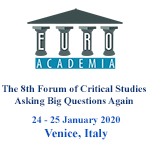Euroacademia Conferences
 Europe Inside-Out: Europe and Europeanness Exposed to Plural Observers (9th Edition) April 24 - 25, 2020
Europe Inside-Out: Europe and Europeanness Exposed to Plural Observers (9th Edition) April 24 - 25, 2020 Identities and Identifications: Politicized Uses of Collective Identities (9th Edition) June 12 - 13, 2020
Identities and Identifications: Politicized Uses of Collective Identities (9th Edition) June 12 - 13, 2020 8th Forum of Critical Studies: Asking Big Questions Again January 24 - 25, 2020
8th Forum of Critical Studies: Asking Big Questions Again January 24 - 25, 2020 Re-Inventing Eastern Europe (7th Edition) December 13 - 14, 2019
Re-Inventing Eastern Europe (7th Edition) December 13 - 14, 2019 The European Union and the Politicization of Europe (8th Edition) October 25 - 26, 2019
The European Union and the Politicization of Europe (8th Edition) October 25 - 26, 2019 Identities and Identifications: Politicized Uses of Collective Identities (8th Edition) June 28 - 29, 2019
Identities and Identifications: Politicized Uses of Collective Identities (8th Edition) June 28 - 29, 2019 The European Union and the Politicization of Europe (7th Edition) January 25 - 26, 2019
The European Union and the Politicization of Europe (7th Edition) January 25 - 26, 2019 7th Forum of Critical Studies: Asking Big Questions Again November 23 - 24, 2018
7th Forum of Critical Studies: Asking Big Questions Again November 23 - 24, 2018 Europe Inside-Out: Europe and Europeanness Exposed to Plural Observers (8th Edition) September 28 - 30, 2018
Europe Inside-Out: Europe and Europeanness Exposed to Plural Observers (8th Edition) September 28 - 30, 2018 Identities and Identifications: Politicized Uses of Collective Identities (7th Edition) June 14 - 15, 2018
Identities and Identifications: Politicized Uses of Collective Identities (7th Edition) June 14 - 15, 2018
Legacy of Culture: The Spectacle as ‘Placemaker’
-
-

-
Presentation speakers
- Verity Adriana, Leeds Trinity University, UK
- Download presentation
Abstract:
The two cities awarded UK City of Culture, Derry (2013) and Hull (2017), have been the second and third most deprived in the whole of the United Kingdom respectively. According to official operational strategy, for Derry 2013 – a city regarded as the birthplace of The Troubles – the remit of the City of Culture programme was to act as ‘peacemaker’. For Hull in 2017, a city that suffered some of the heaviest bombing in the second world war outside of London, and yet has received some of the lowest funding resulting in decades of neglect and post-industrial decline, the year was to act as ‘placemaker’. During 2017 in Hull, the programme offered 365 days of cultural events that saw huge visitor numbers, mainly from the city and local surrounding area, with only 1% visiting from overseas. Most programme artists were of international acclaim, and whilst this offered a world stage within Hull, the lack of inclusion and minimal referencing of Hull’s own culture and heritage has been criticised. A weak finish to the cultural year at its least well-regarded event, an opaque programme handover to the city’s authority and ill-considered post year funding has led to an understated legacy. This paper uses official and own field research to analyse the impact of the City of Culture programme on the reinvention of Hull and questions the ambitious remit of the programme against such engrained systemic issues. European City of Culture 2008, Liverpool, provides a longer legacy with which to consider the lessons of cultural programmes in UK cities with similarly depressed identities. These insights make salient how Hull’s transformation may further develop, and offer insight for how future title winners, such as Coventry, could provide a more meaningful legacy.
-
Related Presentations

European (Dis)Union: Revisiting Theory
- Mila Marinova Temnyalova













